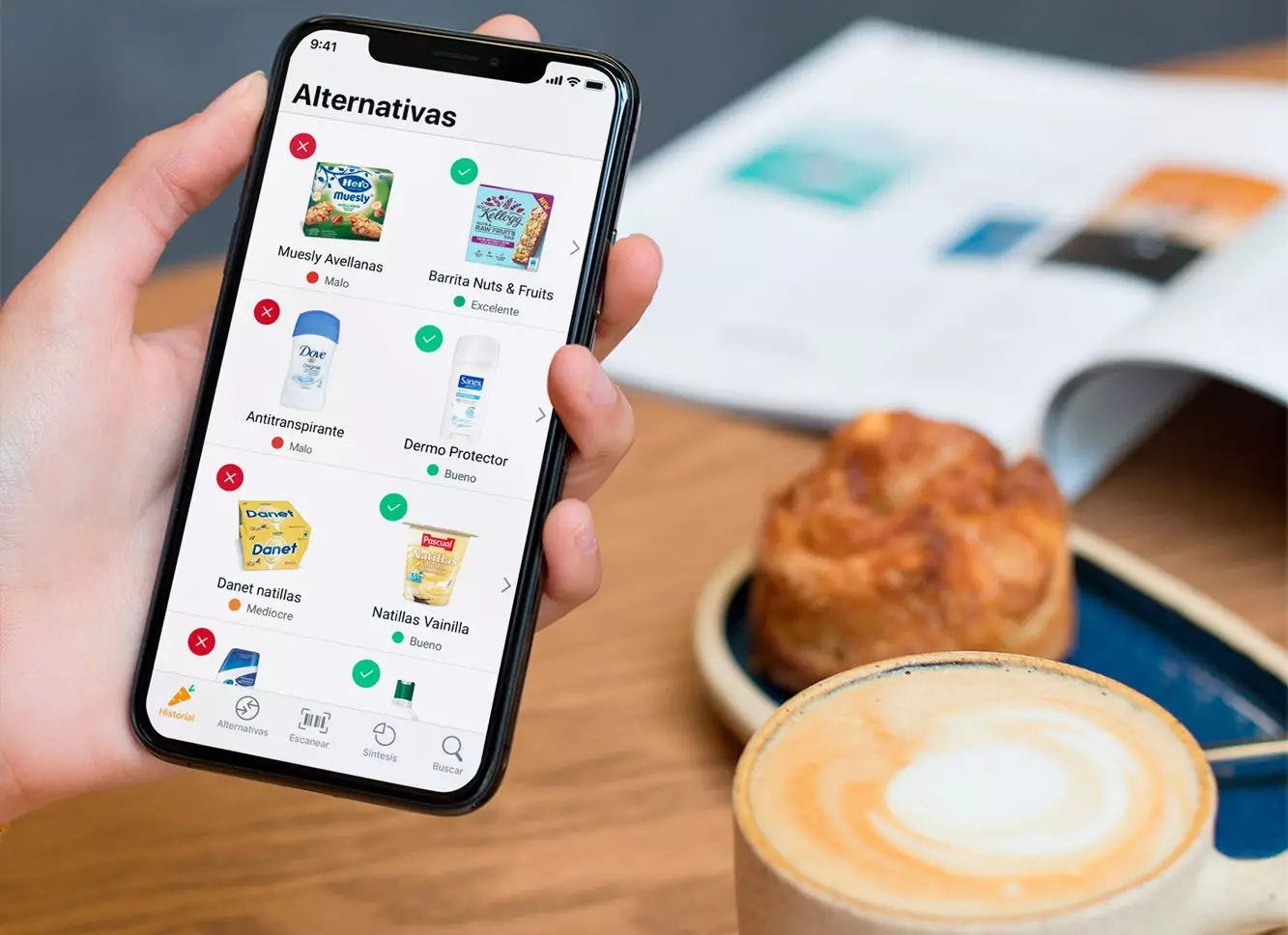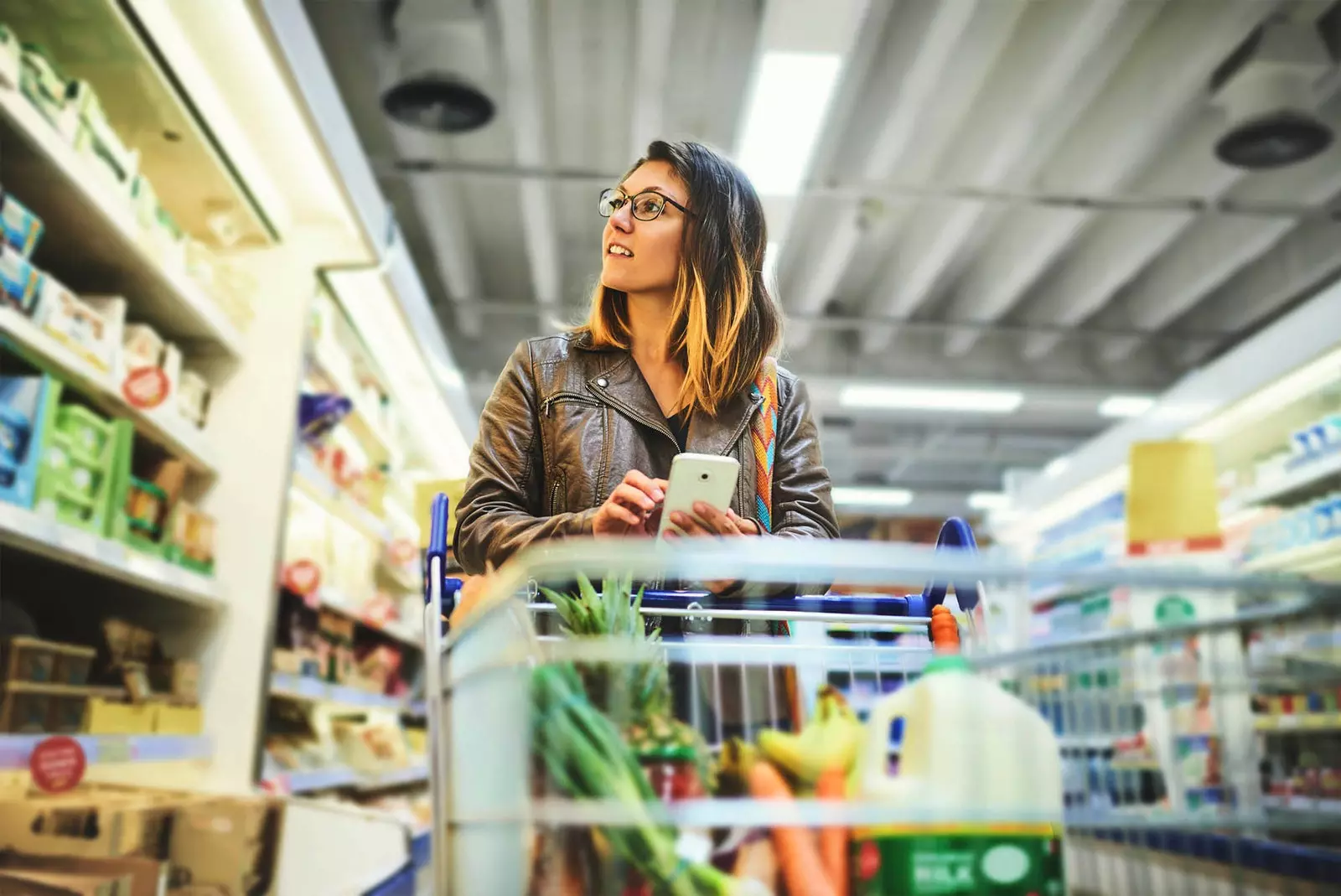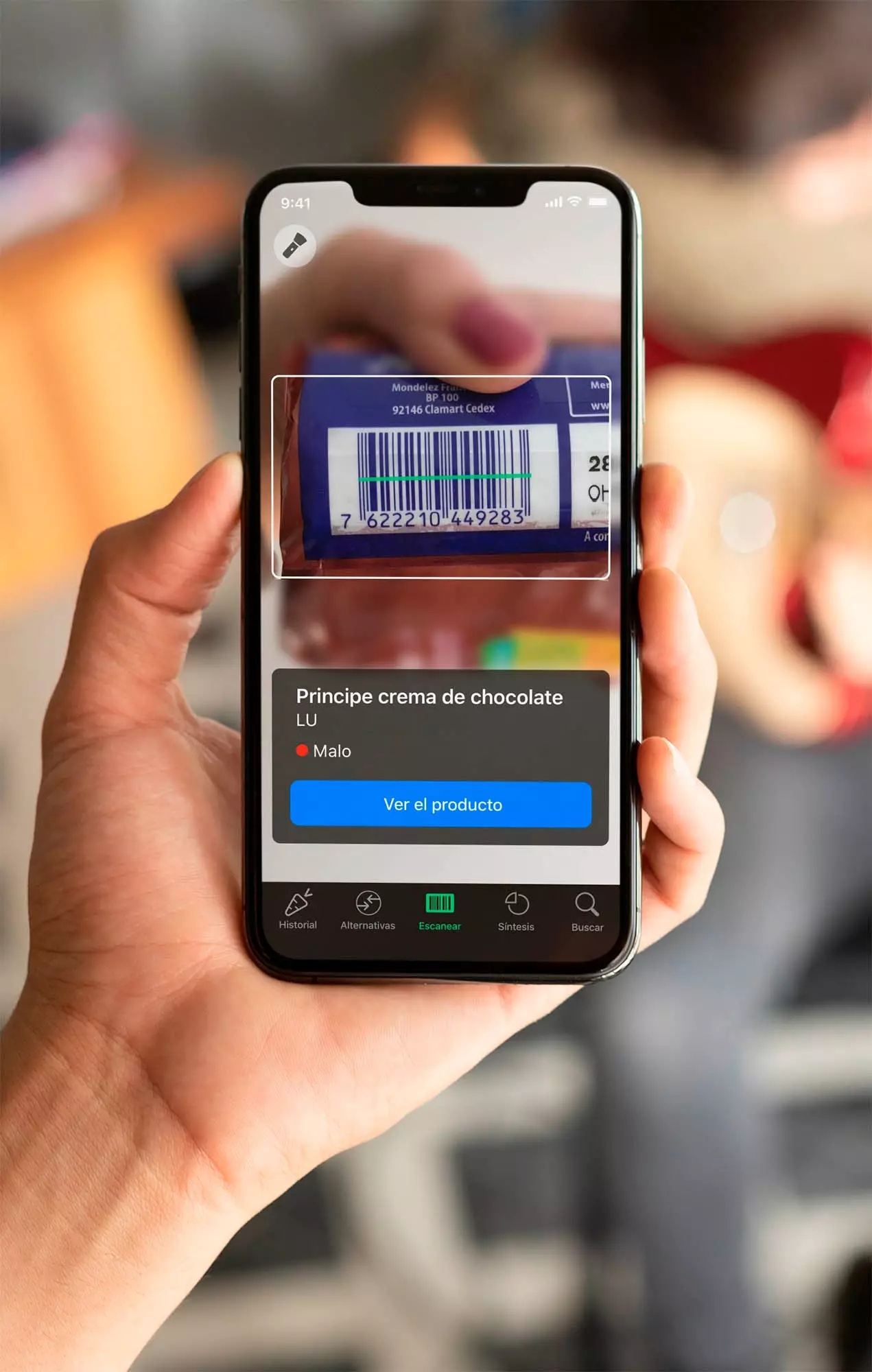
The mobile, a new indispensable ally during the purchase
It is almost impossible that you have not heard of Yuka in the last weeks. For some reason, this app, which has been available in Spain since last May, is now on everyone's lips due to the addictiveness of its proposal in these times when we are all concerned about what we eat: the possibility of scan the barcode of any food or cosmetic product to find out how healthy it is, using a score, which ranges from one to 100. Also, if the item gets a low rating, the app itself suggests healthier options.
The first question that comes to mind is obvious: What system does Yuka follow to evaluate the million products that it has in its database? Ophélia Bierschwale, the company's press officer, clears up the doubt: "Nutritional quality represents 60% of the note," she explains. “The method of calculating nutritional data is based on the Nutri-score , a system that has been adopted in France, Belgium and Spain. This method takes into account the following elements: calories, sugar, salt, saturated fat, protein, fiber, fruits and vegetables.
“Additives make up 30% of the product note,” she continues. “For this, we rely on many sources that have studied the danger of food additives. Our standard for additive analysis is based on the current state of science . We take into account the opinions issued by official bodies such as the EFSA (European Food Safety Authority), the ANSES (French National Agency for Food, Environmental and Work Safety) or the CIRC (International Center for Research on Cancer), as well as all independent scientific studies.
"To end, the ecological dimension represents 10% of the grade . The products considered organic are those that have the European organic label”, they detail from the app, which has already devastated France, where it was born, and Belgium, exceeding thirteen million users (in Spain they are already more than 700,000). .

Yuka shows alternatives to unhealthy products
Despite this spectacular level of penetration, there are not a few voices critical of the program. Perhaps the most notorious is that of Marian García, the nutritionist and doctor of Pharmacy behind the blog Apothecary Garcia , who published a month ago an article entitled Three reasons not to use Yuka.
The first refers, precisely, to the way the app is rated, since the expert does not agree that 60% of it is based on the Nutri-score, also known as the "nutritional traffic light". “ It is a tool that still needs to be perfected ”, he states, citing a tweet from the Ministry of Health which reads: “The French model already implemented is the basis of the classification, but in Spain it will be adapted to the Mediterranean diet, for which the best experts in The matter".
Once those changes are made, García believes that it can be a good indicator for the consumer. "In fact, It would seem to me a better option to guide us only by Nutri-score than by Yuka ”, She writes, since she considers that the remaining 40% of the note is calculated around two debatable parameters: the additives and the ecological nature of its ingredients.
Thus, the professional comes to affirm that the app is chemophobic and unnecessarily alarms the population. "Yuka's goal is not to be alarmist," Bierschwale replies when asked about it. "Their mission is to improve the health of consumers by helping them decipher product labels so they can make the healthiest choices."

There are those who think that the app can generate alarm among consumers
“We just want to draw our users' attention to the content of the products they buy, which may contain potentially dangerous additives. The fact that an additive is authorized by European regulations does not mean that it does not present any danger to health ”, she clarifies, emphasizing that the analysis of the products is based on all the existing scientific works to date for each of the additives. "As a precautionary measure, as soon as an ingredient is controversial, a penalty will be applied," she notes. In addition, she warns us that the app shows the details of the risk associated with each additive, as well as the corresponding scientific sources.
“Yuka aims to analyze the intrinsic quality of products, regardless of the quantity consumed. That is why our grading method is calculated based on 100 grams of product . The idea is not to ban these products, but rather to become aware that a product is bad, in order to adapt the amount we consume”.
SHOULD THE ORGANIC LABEL INFLUENCE THE RATING?
Boticaria García does not agree either that 10% of the grade is calculated based on whether the food is organic or not, since she -and many other nutritionists- considers that that does not add or subtract nutritional character to it . "Before launching the app, the founders had a long brainstorm, involving nutritionists, on the algorithm that would best take into account the important points for today's consumers," recalls Bierschwale.
“The nutritional composition is certainly essential, but other criteria must now be taken into account, such as the level of processing of the products (through the presence of additives that are potentially dangerous to health, even if they are allowed by European regulations). ) . We wanted to give a small bonus (representing 10% of the overall score) to organic products, because organic labels prohibit a number of additives (including the most harmful ones) such as the use of pesticides and GMOs Bierschwale points out.

Eco items score higher in Yuka
“This does not add or subtract the nutritional character, but provides additional guarantees on the absence of certain phytosanitary products that have an impact on health. Yuka's goal is to show the overall impact of products on health, and not just the nutritional composition, ”she summarizes.
SARDINES AND COCA-COLA
All in all, perhaps what is most striking about García's article are the results of her own tests with the app: “Very surprisingly -she writes-, puts sardines in olive oil on the same level (even worse) than a Coca-Cola Zero ”. How do they explain this from Yuka? “Most sardines get a good grade from Yuka. The ones that come out worse than Coca-Cola must contain too much salt and bad fats”, begins Bierschwale.
“But I admit that our method of notation has certain limitations, since no app can represent the complexity of nutrition . Yuka is an indicator. One of these limitations is, for example, that the Nutri-score only takes into account macronutrients and not micronutrients, the glycemic index or the detail of the type of fat. In the example of sardines, it would be very interesting to take into account Omega 3, 6 and 9 fatty acids, which have very beneficial effects for the body”, she concedes, also stating that they intend to improve these results very soon. “We plan to develop more and more specific analyzes for certain products for which the Nutri-score is not relevant, such as sugar, chocolate, eggs...”.
WHAT HAPPENS IF USERS ENTER DATA WRONG?
Other critical voices appear in the application's own opinion area, in which the vast majority are happy with this technology (in the App Store it has 4.8 out of 5, and 4.5 stars out of 5 in the Play Store). Nevertheless, there are those who criticize the data entry method, which can be carried out by the user in the event that it does not find the product in its database.
“Some products are valued as excellent or bad, when ingredients have really been omitted or components that they do not have have been added. They do not have an adequate system to contrast the data entered. In conclusion, it is not 100% reliable. ”, writes a user named Johana, who is contacted by those responsible for the app.
However, Yuka, according to its creators, has various means of control in place to avoid these failures. Thus, there are automatic controls , the first barrier that detects erroneous or inconsistent data and prevents it from being entered. But, in addition, three people work full time correcting the 'false' information displayed by the application, whose faults, they say, are corrected in less than 24 hours.
"We have 13 million users that today represent our largest surveillance base, and we also track possible errors and changes in the composition of which we have not been informed through the brands," they clarify from Yuka. Likewise, following the model of platforms such as Wikipedia, users who voluntarily enter incorrect data are eliminated, who will no longer be able to use the program again. With all this information, the decision as to whether Yuka is a good tool or not is up to you.

Will we end up scanning everything?
